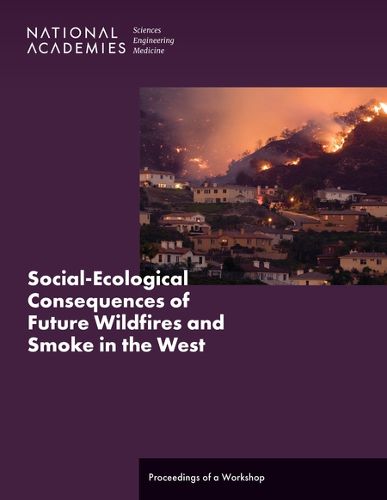Readings Newsletter
Become a Readings Member to make your shopping experience even easier.
Sign in or sign up for free!
You’re not far away from qualifying for FREE standard shipping within Australia
You’ve qualified for FREE standard shipping within Australia
The cart is loading…






Over the past two decades, wildfires in western North America have greatly increased in frequency, magnitude and severity. Scientists have documented three main causes - a century of suppression and inadequate forest management that has led to overly dense, fuel-rich forests; climate change, turning woodlands and grasslands into hot, dry tinder boxes; and the spread of urbanization, increasing the probability of man-made ignitions. Less well known are the environmental and social implications associated with the acceleration of these trends.
To explore these concerns and to identify possible policy responses, the National Academies of Sciences, Engineering, and Medicine's Board on Environmental Change and Society, in partnership with the Royal Society of Canada, convened a workshop in June 2024, "The Social and Ecological Consequences of Future Wildfire in the West". Over two days, two dozen wildfire experts and a hybrid audience of over 200 participants explored the history, current state, and anticipated future of wildfire science and policy across the western United States and Canada. This publication summarizes the presentations and discussions of the workshop.
Table of Contents
Front Matter 1 Introduction 2 Fire in the Past, Fire in the Mind, Fire in the Future 3 The Trajectory of Wildfire in the West 4 The Range and Scope of Social-Ecological Consequences of Wildfire in the West 5 Real-World Perspectives on Wildfire: Analyzing Case Studies from the Fort McMurray, Woolsey, and Maui Case Studies 6 Critical Gaps in the Social-Ecological Understanding of Wildfire Consequences 7 Reflections on Wildfire Management 8 The Socio-Ecological Consequences of Wildfires: Challenges, Research Needs, and Gaps in Understanding 9 Stories from Impacted Communities 10 Fire Technology for Social Resilience 11 Policy, Funding, and Action 12 Reflections on Workshop Themes Appendix A: Workshop Agenda Appendix B: Planning Committee Members and Speaker Biographies
$9.00 standard shipping within Australia
FREE standard shipping within Australia for orders over $100.00
Express & International shipping calculated at checkout
Over the past two decades, wildfires in western North America have greatly increased in frequency, magnitude and severity. Scientists have documented three main causes - a century of suppression and inadequate forest management that has led to overly dense, fuel-rich forests; climate change, turning woodlands and grasslands into hot, dry tinder boxes; and the spread of urbanization, increasing the probability of man-made ignitions. Less well known are the environmental and social implications associated with the acceleration of these trends.
To explore these concerns and to identify possible policy responses, the National Academies of Sciences, Engineering, and Medicine's Board on Environmental Change and Society, in partnership with the Royal Society of Canada, convened a workshop in June 2024, "The Social and Ecological Consequences of Future Wildfire in the West". Over two days, two dozen wildfire experts and a hybrid audience of over 200 participants explored the history, current state, and anticipated future of wildfire science and policy across the western United States and Canada. This publication summarizes the presentations and discussions of the workshop.
Table of Contents
Front Matter 1 Introduction 2 Fire in the Past, Fire in the Mind, Fire in the Future 3 The Trajectory of Wildfire in the West 4 The Range and Scope of Social-Ecological Consequences of Wildfire in the West 5 Real-World Perspectives on Wildfire: Analyzing Case Studies from the Fort McMurray, Woolsey, and Maui Case Studies 6 Critical Gaps in the Social-Ecological Understanding of Wildfire Consequences 7 Reflections on Wildfire Management 8 The Socio-Ecological Consequences of Wildfires: Challenges, Research Needs, and Gaps in Understanding 9 Stories from Impacted Communities 10 Fire Technology for Social Resilience 11 Policy, Funding, and Action 12 Reflections on Workshop Themes Appendix A: Workshop Agenda Appendix B: Planning Committee Members and Speaker Biographies